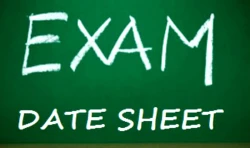The conference held under auspices of European Mathematical Society, International Mathematical Union, Higher Education Commission Pakistan, UNESCO, National Centre for Mathematics and International Centre for Theoretical Physics, Italy.
About 500 eminent mathematicians from 27 countries of the world including Canada, India Italy, France, USA, Turkey, Sweden, Japan, Norway, Saudi Arabia, Romania, Bulgaria, Nepal and Netherlands are participating in the four day conference spread over 21 technical sessions on Analysis, Geometry and Algebra, Discrete Mathematics and Applied Mathematics. American Mathematical Society fellow Pierre Cartier was the chief guest at the opening ceremony of the conference which was chaired by GCU VC Dr Khaleequr Rahman.
Addressing the ceremony, the VC said Mathematics was the language of all natural sciences and Mathematical theories underpinned many of the most brilliant discoveries in physics, chemistry, life sciences, economics, etc. He believed that future of mathematics was bright in Pakistan due the presence doctoral school like Abdus Salam School of Mathematical Sciences. He said that GCU ASSMS had played a very vital role in development of mathematical sciences in the country and emerged as a regional centre of excellence.
Talking about the objective of the conference, GCU ASSMS Director General Dr AD Raza Choudhry said the conference was aimed at fertilisation of new ideas through sharing of knowledge and interaction. He said that about 140 of 250 submitted papers were selected for presentation in the conference. �It is not just a conference, rather it�s a platform for the mathematicians from all over the world to exchange ideas about mathematics, education and research and such an interaction can lead to fruitful long term collaborations which would be beneficial for the development of mathematics in Pakistan,� the ASSMS DG said.
Speaking on the occasion, Pierre Cartier said that the volume of mathematical knowledge was too big to be mastered by a single individual, so preserving, transmitting and using that knowledge had appeared to be biggest challenge of the 21st century.



.webp)
.webp)




